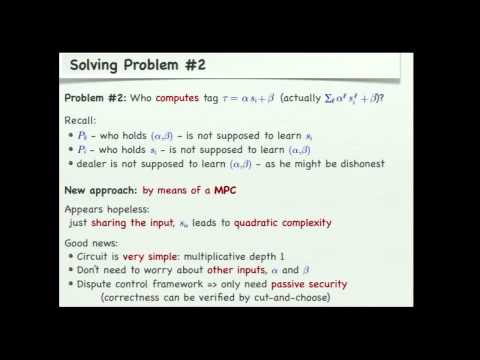Welcome to the resource topic for 2011/629
Title:
Near-Linear Unconditionally-Secure Multiparty Computation with a Dishonest Minority
Authors: Eli Ben-Sasson, Serge Fehr, Rafail Ostrovsky
Abstract:Secure multiparty computation (MPC) allows a set of n players to compute any public function, given as an arithmetic circuit, on private inputs, so that privacy of the inputs as well as correctness of the output are guaranteed. Of special importance both in cryptography and in complexity theory is the setting of information-theoretic MPC, where (dishonest) players are unbounded, and no cryptographic assumptions are used. In this setting, it was known since the 1980’s that an honest majority of players is both necessary and sufficient to achieve privacy and correctness. The main open question that was left in this area is to establish the exact communication complexity of MPC protocols that can tolerate malicious behavior of a minority of dishonest players. In all works, there was a large gap between the communication complexity of the best known protocols in the malicious setting and the honest-but-curious'' setting, where players do not deviate from the protocol. In this paper, we show, for the first time, an MPC protocol that can tolerate dishonest minority of malicious players that matches the communication complexity of the best known MPC protocol in the honest-but-curious setting. More specifically, we present a new n-player MPC protocol that is secure against a computationally-unbounded active and malicious adversary that can adaptively corrupt up to a minority t < n/2 of the players. For polynomially-large binary circuits that are not too unshaped, our protocol has an amortized communication complexity of O(n log n + k/n^c) bits per multiplication (i.e. AND) gate, where k denotes the security parameter and c is an arbitrary non-negative constant. This improves on the previously most efficient protocol with the same security guarantee, which offers an amortized communication complexity of O(n^2 k) bits per multiplication gate. For any k polynomial in n, the amortized communication complexity of our protocol matches the best known O(n log n) communication complexity of passive security MPC protocol. Thus, our result gives the first near-linear complexity of MPC (instead of quadratic) in the dishonest-minority setting and settles the question of the difference in communication complexity between the honest-but-curious and fully malicious settings. For sufficiently large circuits, our protocol can be improved only if the honest-but-curious protocol can be improved. We introduce several novel techniques for reducing communication complexity of MPC in the malicious setting that are of independent interest and we believe will have wider applicability. One is a novel idea of computing authentication tags by means of a mini MPC, which allows us to avoid expensive double-sharings when dealing with malicious players; the other is a batch-wise multiplication verification that allows us to speedup Beaver's multiplication triples’'. The techniques draw from the PCP world and this infusion of new techniques from other domains of computational complexity may find further uses in the context of MPC.
ePrint: https://eprint.iacr.org/2011/629
Talk: https://www.youtube.com/watch?v=p6JulLVdOVg
Slides: https://iacr.org/cryptodb/archive/2012/CRYPTO/presentation/12-2-Fehr.pdf
See all topics related to this paper.
Feel free to post resources that are related to this paper below.
Example resources include: implementations, explanation materials, talks, slides, links to previous discussions on other websites.
For more information, see the rules for Resource Topics .
